How to Clone Hard Drive to USB External Drive
USB flash drives and USB external hard drives are widespread and convenient because they are small and portable. People tend to save files, data, and the operating system to these external devices. Cloning hard drives is a process of copying the content of a hard drive entirely to another location. To save time and energy, people often clone a hard drive to a USB external drive.
- The Recommended Way - Clone Hard Drive to USB External Drive
- Part 1. How to Clone Hard Drive to a USB Hard Drive (Including OS)
- Part 2. How to Clone Hard Drive to USB Flash Drive (Only Data)
Can I Clone My Hard Drive to a USB Flash Drive
"Is there any safe and efficient way to clone an HDD to a USB drive? I'm using a Lenovo Essentials laptop that has a small internal hard drive to store data. So I want to make an exact copy of the hard drive onto an external USB flash drive. Do I need some special disk clone software? I should perform a bit-for-bit clone my files or settings to an external USB drive. So I can successfully transfer or backup the data to the USB drive. If you have a similar experience, please help!"
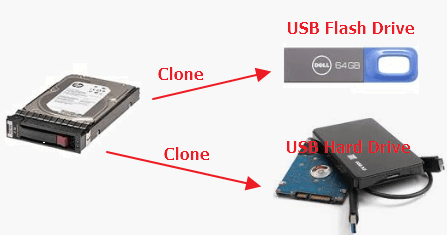
The Recommended Way - Clone Hard Drive to USB External Drive
Windows don't have such a cloning utility to clone HDD to USB, so we recommend you to use an easy and straightforward software - Qiling Disk Copy. It can move your data, operating system, and application to another hard drive without data loss.
Your Reliable USB Flash Drive Clone Software
- Make a copy of the files from one hard drive to a USB flash drive/USB hard drive.
- Clone a hard drive with bad sectors.
- Upgrade your computer hard drive.
- Back up your important files regularly.
Part 1. How to Clone Hard Drive to a USB Hard Drive
To clone the operating system and the data to a USB drive, here is the complete guide.
1- Check Your Targeted USB Hard Drive.
- One thing you need to mention that the cloning operation will overwrite the targeted USB hard drive. If you have important files on it, please note you need to back up all data. Try this free backup software.
- Make sure your USB hard drive has enough space to store data.
2 - Prepare the Tools You Need.
If your USB drive is an external hard drive, you can clone both the OS and data to the external drive easily. Now, download the clone software, Qiling Disk Copy, and take a look at the following step-by-step guide to clone hard drive OS or data to external devices. It is compatible with Windows 10/8.1/8/7/Vista/XP.
Click the button below and activate Qiling disk clone software in advance.
3 - Steps to Clone Hard Drive to USB External Drive
If you clone your HDD to a USB for data backup/transfer or other similar reasons, follow the steps below.
Step 1. Download, install and run Qiling Disk Copy on your PC.
On Qiling Disk Copy, click "Disk/Partition clone" to start cloning.
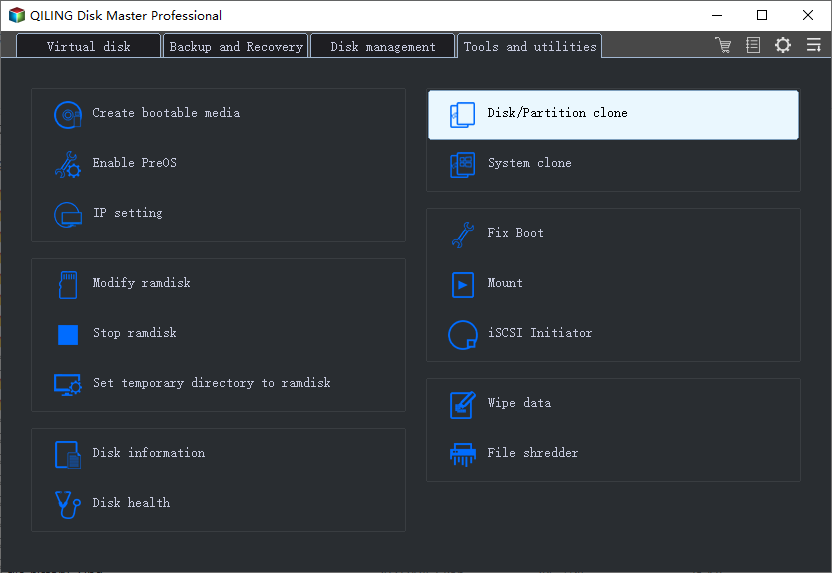
Step 2. Select the hard drive that you want to copy or clone and click "Next".
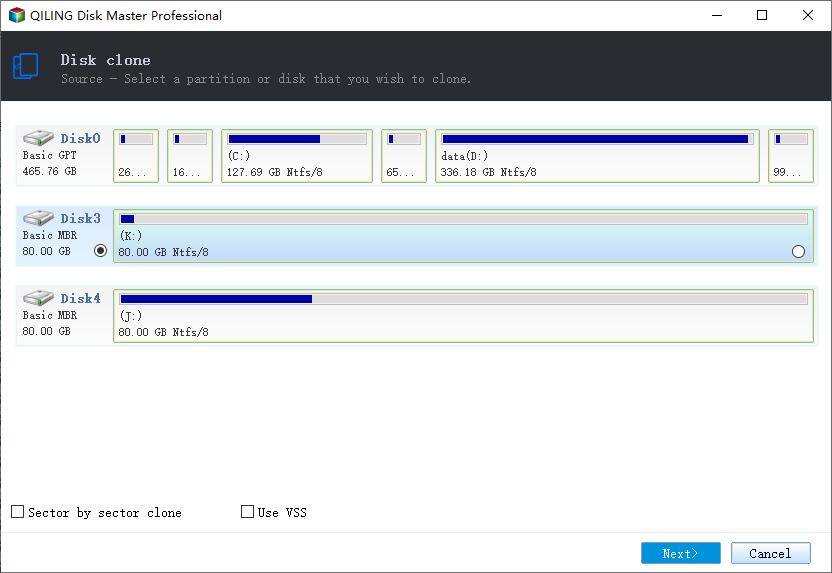
Step 3. Select the USB flash drive as your destination.
Note: The destination disk should be at least the same big or even larger than the source disk if you want to copy or clone the source hard disk.
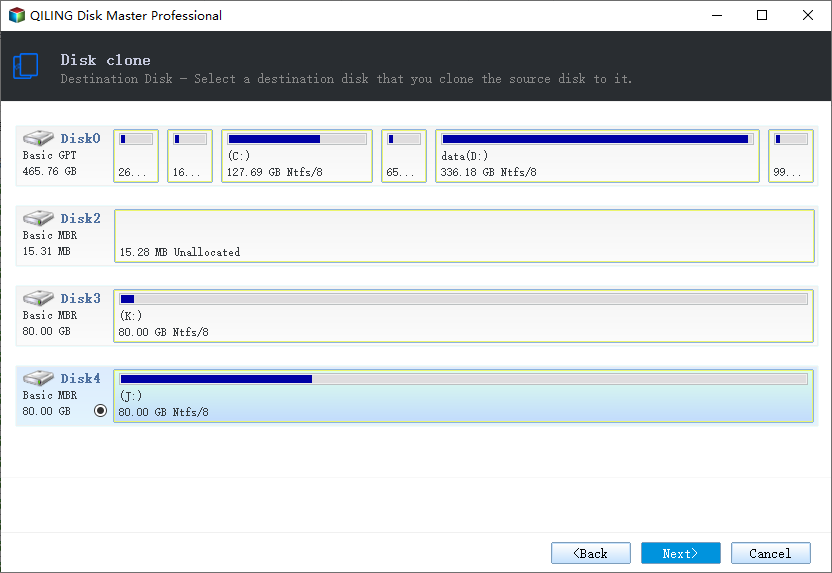
Step 4. Check and edit the disk layout. You can manage the disk layout of the destination disk by draging the left or right border of the partition.
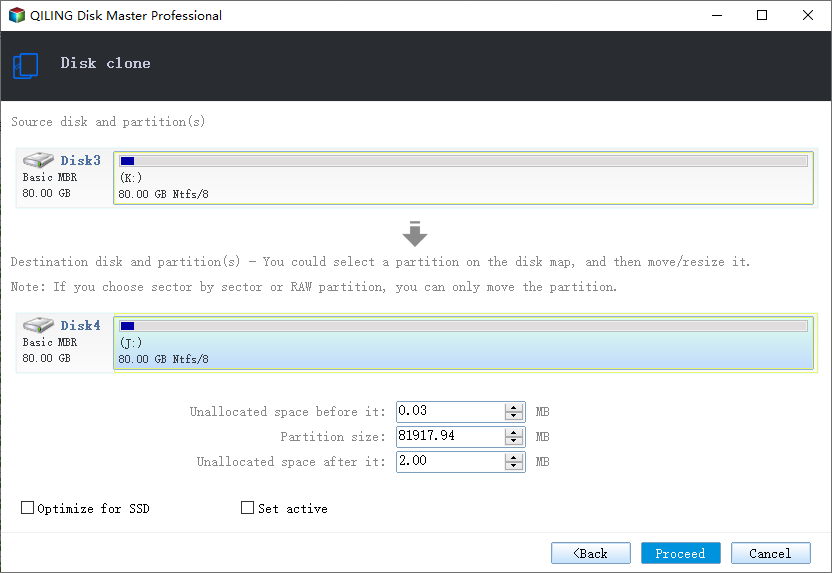
- Sector by sector clone: Copy as the source option will copy/clone the same layout of partitions on your source disk to the destination disk.
- Edit disk layout allows you to resize or move partition layout on the destination disk manually.
- If your destination disk is an SSD drive, do remember to tick "Optimize for SSD" option if the target is SSD.
Step 5: Click "Proceed" to start the hard drive cloning process.
A message now appears, warning you that data will be lost. Please confirm this message by clicking "OK".
Part 2. How to Clone Hard Drive to USB Flash Drive
To back up or transfer your hard drive data, here is the complete guide.
1 - Prepare The Tool You Need - Qiling Disk Copy
Qiling Disk Copy is a professional backup tool. It serves to fulfill your needs of data transfer/backup. For example, with this tool, you can easily:
- Create a bootable clone of Windows 10/8/7
- Recover data from HDD with bad sectors
- Clone UEFI disk to SSD
- Transfer Windows 10 to a USB flash drive and more
Now you may know that cloning an HDD to a USB is just one of the many things Qiling Disk Copy. Download and install the dominant software on your computer, then follow to clone your hard drive to a USB flash drive with ease.
2 - Steps to Clone Hard Drive to USB Flash Drive
Make sure your USB is empty, or the cloned data may overwrite the data on it. The storage space must be larger than the used space on your hard drive or the files on the source device may not be copied fully.
In this section, you need to use the "Partition Mode" to perform a partition clone instead of a disk clone.
Step 1. Run Qiling Disk Copy on your PC. click "Disk/Partition clone" in the Tools page to start cloning.

Step 2. Select the source partitions that you want to copy or clone. Click "Next" to continue.
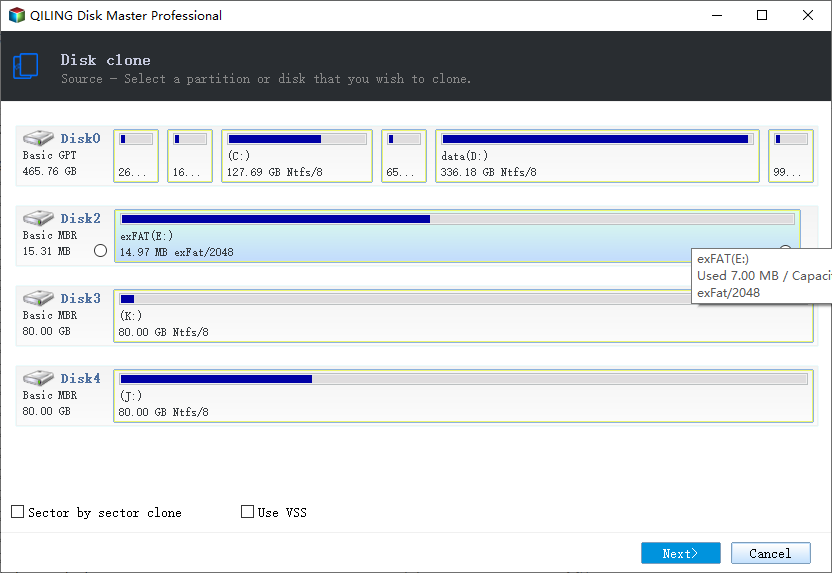
Step 3. Select the target partition where you want to clone/copy the source partition to.
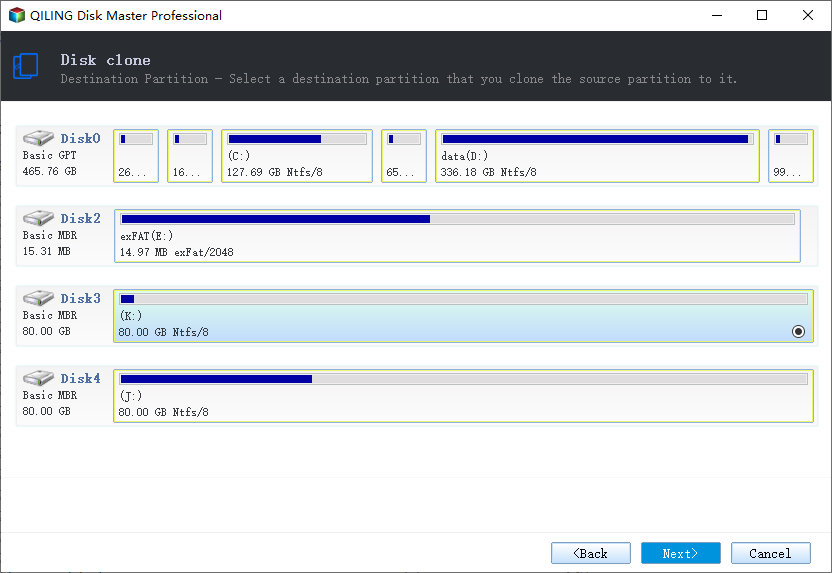
Step 4. Check and edit the partition layout. You can manage the disk layout of the destination disk by draging the left or right border of the partition.
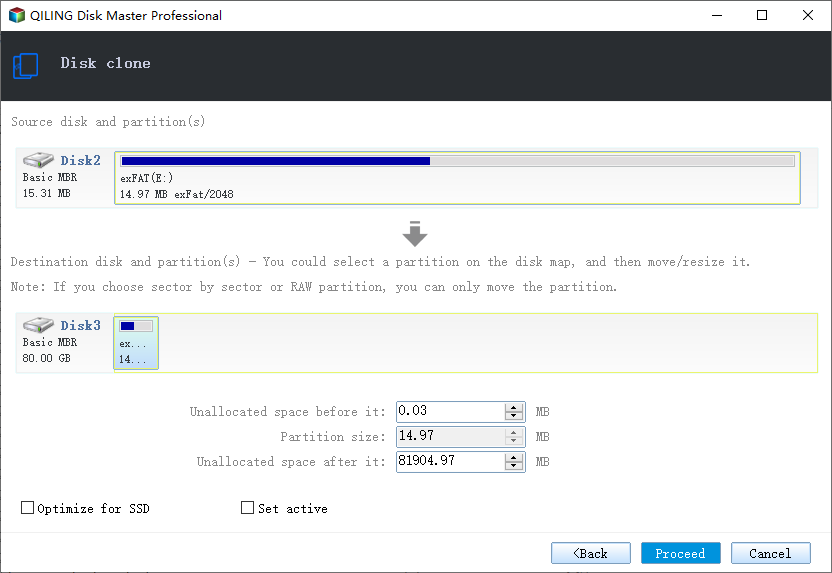
Step 5. Click "Proceed" to start the disk cloning or disk copying process now.
Given that data loss happens quite often, you should equip your computer with such a tool to avoid completely losing files. Don't be the one who realizes the severity of data loss after the disaster occurs. Be the one who prevents failure from happening.
Why Do You Need to Clone HDD to USB
People might need to clone a hard drive to an external USB flash drive for specific reasons. Here are the commonest ones:
Data Backup/Transfer
Most users choose to clone HDD to a USB drive for data backup or transfer. It is the best way to protect user data from virus attack, hard drive crash, disk corruption, or any other accidents or free up some disk space, especially when you have a small internal hard drive disk. (If you accidentally lost data on your hard drive, learn how to perform data recovery with the best hard drive recovery software.)
System Clone
It's not rare for users to make Windows portable or do a system clone. By cloning Windows to a USB, you can use your operating system wherever you need it. However, if your target device is USB flash drive, not USB hard drive, you may encounter booting issues after the cloning process. If you do it for system clone or creating a portable device, learn how to create portable Windows 10 on USB.
Conclusion
That's the way to clone hard drive to USB flash drive in Windows 10/8/7. And it can be applied to clone disk to SSD/HDD and other internal or external devices. Whenever you want to clone an HDD/SSD, ask Qiling Disk Copy for help. If you are faced with these questions and problems, you can solve them with this article.
- How do I copy my entire hard drive to an external drive?
- How do I clone a bootable USB drive?
- How do I clone my hard drive to SSD with USB?
- How do I transfer data from hard drive to USB?
Clone HDD to USB Frequently Asked Questions
If you have HDD or SSD cloning problems, read these related questions to get additional help.
1. What is Hard Drive Cloning?
Hard drive cloning is the process of creating a 1-to-1 copy of a hard disk drive (HDD) or solid-state drive (SSD), not just its files. HDD cloning may be used for upgrading a disk or replacing an aging disk with a fresh one. In this case, the clone can replace the original drive on its host computer.
2. How long does Hard Drive Cloning take?
It depends on the amount of data and the transfer speed. If your cloning speed is 100MB/s, it takes about 17 minutes to clone a 100GB hard drive.
3. How do I transfer data from hard drive to USB?
Step 1. Run Qiling Disk Copy on your PC. click "Disk/Partition clone" in the Tools page to start cloning.
Step 2. Select the source partitions that you want to copy or clone.Click "Next" to continue.
Step 3. Select the target partition to clone/copy the source partition.
Step 4. Check and edit the partition layout
Step 5. Click "Proceed" to start the partition cloning or partition copying process now.
Related Articles
- HDD RAW Copy Tool: Upgrade Disk, Copy Disk, Recover Disk
- [Get it now!] Super Fast Disk Cloning/Copying Software
- Linux Clone HDD to SSD Without Re-installing
- Clone UEFI Disk to SSD without Boot Issue (Full Guide)